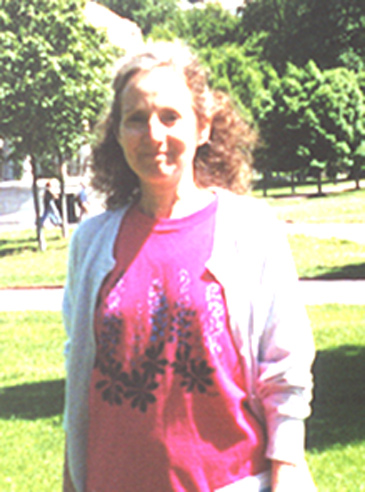
Melanie Ehrlich, Ph.D.
Mammalian DNA Methylation and Chromosome Structure

Melanie Ehrlich, Ph.D. SUNY - Stony Brook, 1970
Professor of Biochemistry
|
We are studying
two rare and fascinating genetic syndromes, facioscapular humeral muscular dystrophy (FSHD) and
immunodeficiency, centromeric region instability, and facial anomalies (ICF) as well as Wilms tumors,
a type of pediatric cancer, and ovarian cancers. This research centers around DNA methylation and
chromatin structure. The first of these investigations involves a little-studied form of inherited
muscular dystrophy, for which there is much circumstantial evidence that patients have inherited a
loss of a "normal" (genetically programmed) heterochromatin silencing of adjacent genes. FSHD's
dominant inheritance is governed by tandem subtelomeric repeats in chromosome 4 which is postulated
to affect expression of genes in cis. FSHD is linked to a reduction in the copy-number of a
tandem 3.3-kb repeat on one chromosome 4. This repeat (D4Z4) is polymorphic in copy number
(11-100 copies) and almost always present in too few copies (< 11) on one chromosome 4 homologue
in FSHD patients. The loss of a high copy-number for the chromosome 4 D4Z4 repeats is
postulated to lead to inappropriate expression of genes at least 100 kb away. However,
there is no direct evidence that even the repeat region itself is heterochromatic and no
evidence that heterochromatinization spreads from the repeat region. We are investigating
this with chromatin analysis techniques and model systems using FSHD and control myoblast
and lymphoblastoid cell cultures and muscle biopsies. The second project is studying the relationship between decreased DNA methylation and diagnostic
pericentromeric rearrangements in human chromosomes 1 and 16 in a rare recessive disease (ICF,
immunodeficiency, centromeric region instability, facial anomalies). ICF is caused by mutations
in the third known DNA methyltransferase gene. We have published evidence suggesting that the
very frequent, and often extreme, decondensation (visualized in metaphase chromosomes) that
is targeted to these two chromosomes in ICF lymphoblastoid cell lines and mitogen-stimulated
lymphocytes predisposes to pericentromeric rearrangements including the formation of
multibranched chromosomes with up to 12 arms of chromosomes 1 and 16. We use ICF and control
lymphoid cell lines and immunological, cytochemical, and nuclei acid analysis tools for this
research. The third project is cytogenetic analysis of Wilms tumors correlated with examination of the
frequent hypomethylation of centromeric, juxtacentromeric, or other DNA repeats in these tumors.
Also, we are studying ovarian epithelial tumors and ovarian tumor cell lines and hypomethylation of
DNA repeats in these tumors. We are examining the prognostic significance of these epigenetic
alterations, analyzing how they occur, and their biological significance with Southern blot
techniques and RNA analysis methods on tumor samples and tumor cell lines. |